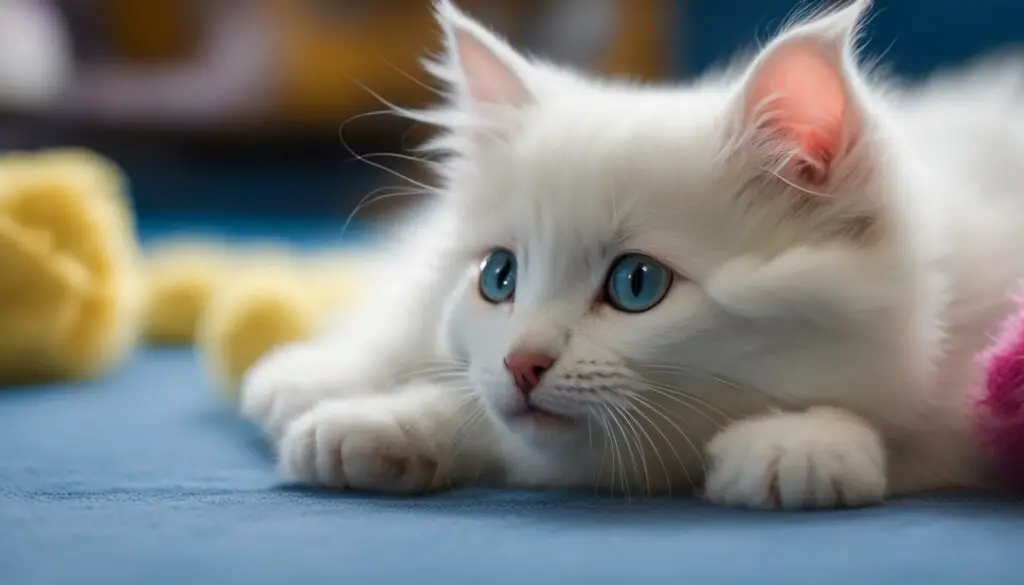Hey there, fellow feline enthusiasts! Today, I want to talk about a common issue that many kitten owners face – gassy kittens. We all want our little furballs to feel comfortable and happy, so I’m here to share some simple remedies that can provide much-needed relief to your gassy kitten. Trust me, they’ll thank you for it!
Dealing with a gassy kitten can be a bit of a challenge, but with the right steps, you can make a world of difference. By understanding the causes of gas in kittens, managing their diet, and seeking appropriate medical care when needed, you’ll be well on your way to helping your little one feel better. So, let’s dive in and learn how to bring comfort to your gassy kitten!
Key Takeaways:
- Gas in kittens can have various causes, including dietary factors, medical conditions, and intestinal parasites.
- Managing your kitten’s diet by choosing a low-fiber or soy-based food and feeding smaller, more frequent meals can help reduce gas.
- If dietary changes don’t help, there may be an underlying medical issue, and seeking veterinary care is crucial.
- Intestinal parasites can cause gas in kittens, and medication may be necessary to eliminate them.
- Regular veterinary check-ups, proper diet management, and parasite prevention can help prevent gas in kittens in the long run.
Understanding the Causes of Gas in Kittens
Gas in kittens can be an uncomfortable and distressing issue. It is important to understand the various causes of gas to effectively address the problem and provide relief for your furry friend. Here, we will explore the common factors that can contribute to kitten stomach bloating, kitten gas symptoms, and other digestive issues.
Dietary Factors
Table: Common Gas-Inducing Foods for Kittens
| Food | Potential to Cause Gas |
|---|---|
| High-Fiber Diet | Can lead to excess fermentation in the gut, resulting in gas production. |
| Soy-based Food | Some kittens may have a sensitivity to soy, leading to digestive issues and gas. |
Diet plays a crucial role in the digestive health of kittens. High-fiber diets and soy-based foods can contribute to excess gas production in their gastrointestinal tract. It is advisable to opt for cat food brands that have lower fiber content and avoid soy-based options. Gradually transitioning your kitten to the new food will allow their digestive system to adjust, reducing the likelihood of gas symptoms.
Medical Conditions
Table: Common Medical Conditions Associated with Gas in Kittens
| Condition | Gas Symptoms |
|---|---|
| Inflammatory Bowel Disease (IBD) | Chronic inflammation in the digestive tract can lead to excessive gas. |
| Gastrointestinal Infections | Infections can disrupt normal digestion and contribute to gas production. |
Gas in kittens can also be a sign of underlying medical conditions. Inflammatory bowel disease (IBD) and gastrointestinal infections are known to cause chronic inflammation and disruption of normal digestion, leading to increased gas production. If dietary changes do not alleviate the gas symptoms, it is important to consult a veterinarian for proper diagnosis and treatment.
Intestinal Parasites
Table: Common Intestinal Parasites in Kittens
| Parasite | Symptoms |
|---|---|
| Roundworms | Gas, bloating, diarrhea |
| Hookworms | Gas, anemia, weight loss |
Intestinal parasites can also contribute to gas-related symptoms in kittens. Roundworms and hookworms are common parasites that can cause gas, bloating, and other digestive issues. It is important to follow your veterinarian’s recommended deworming schedule and administer appropriate medication to eliminate these parasites.
Understanding the causes of gas in kittens is the first step towards providing them with the necessary relief. By addressing dietary factors, considering potential medical conditions, and deworming for parasites, you can help alleviate your kitten’s discomfort and promote a healthier digestive system.
Diet Management for Gassy Kittens
Managing your kitten’s diet is a crucial step in reducing gas and promoting their overall digestive health. By making some simple changes to their food and feeding routine, you can help prevent excessive gas and discomfort.
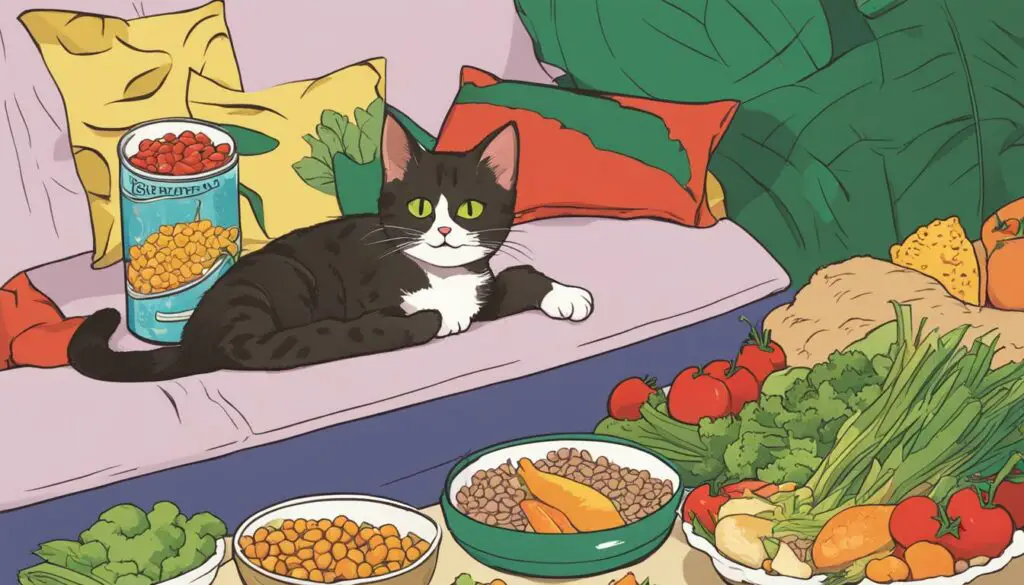
Choosing the Right Food
Consider switching your kitten’s food to a brand with lower fiber or soy content. These ingredients can sometimes contribute to increased gas production. Look for a high-quality cat food that is specifically formulated for kittens and promotes easy digestion.
Gradual Transition
When introducing a new food, it’s important to do so gradually. Start by mixing a small amount of the new food with their current food, gradually increasing the ratio over a few days. This allows your kitten’s digestive system to adjust and minimizes the chances of developing gas.
Feeding Frequency and Portion Control
Feeding smaller meals more frequently throughout the day can help prevent overeating and reduce the risk of excessive gas. Avoid leaving food out all day for free feeding. Instead, establish a regular feeding schedule to regulate your kitten’s portion sizes.
By paying attention to your kitten’s diet and making these simple adjustments, you can effectively manage and prevent gas-related issues. Remember to consult your veterinarian for personalized advice and guidance specific to your kitten’s needs.
Medical Treatment for Gassy Kittens
When dietary changes are not enough to alleviate your kitten’s gas problems, it is time to consider medical treatment. There could be an underlying medical condition causing the excessive gas, and it’s important to address it for your kitten’s comfort and wellbeing. Here are some potential medical treatments that your veterinarian may recommend:
- Corticosteroids: These medications can help reduce inflammation in the digestive system, which may be contributing to your kitten’s gas. They can be given orally or through injections, depending on the severity of the condition.
- Antibiotics: If your kitten has an infection in their gastrointestinal tract, antibiotics may be prescribed to eliminate the bacteria or other microorganisms causing the issue.
- Probiotics: These supplements contain beneficial bacteria that can help restore the balance of your kitten’s gut flora. They can be especially helpful if the gas is caused by an imbalance in the digestive system.
It’s important to follow your veterinarian’s instructions for administering any medications and to complete the full course of treatment if prescribed. Additionally, your vet may recommend additional diagnostic tests or procedures to further evaluate your kitten’s condition and guide the treatment plan.

If your kitten’s gas problems persist despite medical treatment, your vet may need to explore other possible causes and treatment options. It’s always best to consult with a professional to ensure the best care for your furry friend.
Case Study: Successful Treatment of Gassy Kitten
“My kitten, Fluffy, had been suffering from severe gas problems for weeks. I tried various dietary changes but saw no improvement. Finally, I took Fluffy to the vet, who diagnosed her with inflammatory bowel disease. With a combination of corticosteroids and a special diet, Fluffy’s gas problems significantly improved. I am grateful for the medical treatment that allowed Fluffy to live a happier and more comfortable life.”
| Treatment Option | Description |
|---|---|
| Corticosteroids | Reduce inflammation in the digestive system |
| Antibiotics | Treat gastrointestinal infections |
| Probiotics | Restore balance to the gut flora |
Table: Medical Treatment Options for Gassy Kittens
Intestinal Parasites and Gas in Kittens
If your kitten is experiencing persistent gas, it’s important to consider the possibility of intestinal parasites. These parasites can cause discomfort and digestive issues, leading to excessive gas production. Understanding how to relieve gas in kittens affected by intestinal parasites is crucial for their well-being.
Intestinal parasites commonly found in kittens include roundworms, hookworms, and tapeworms. These parasites can enter the kitten’s digestive system through contaminated food, water, or soil. They attach themselves to the intestinal wall, disrupting digestion and causing gas.
To relieve gas in kittens with intestinal parasites, it’s essential to consult your veterinarian. They will recommend appropriate medication to eliminate the parasites. It’s crucial to strictly follow the prescribed treatment plan and administer the medication as instructed. This will help prevent reinfection and alleviate your kitten’s gas symptoms.
| Intestinal Parasite | Treatment |
|---|---|
| Roundworms | Deworming medication |
| Hookworms | Deworming medication |
| Tapeworms | Deworming medication |
Remember to maintain good hygiene practices to prevent the spread of parasites. Regularly clean your kitten’s litter box, wash their bedding, and keep their living environment clean. Additionally, practice flea control to reduce the risk of tapeworm infestations, as fleas can transmit tapeworm eggs.
Natural Remedies for Gassy Kittens
When it comes to managing gas in kittens, there are a variety of natural remedies that can help alleviate their discomfort. These remedies focus on promoting healthy digestion and reducing gas production. Here are some effective natural remedies for gassy kittens:
Dietary Fiber
Feeding your kitten a diet rich in dietary fiber can promote regular bowel movements and reduce the likelihood of gas buildup. Opt for high-quality cat foods that contain natural sources of fiber, such as pumpkin or sweet potatoes. These ingredients can help regulate your kitten’s digestive system and alleviate gas.
Probiotics
Probiotics are beneficial bacteria that can help restore balance in your kitten’s gut flora. These live microorganisms can aid in the digestion process and prevent the overgrowth of harmful bacteria that could contribute to gas. Look for probiotic supplements specifically formulated for kittens or consult your veterinarian for recommendations.
Herbal Remedies
Certain herbs, such as fennel and peppermint, have natural gas-relieving properties and can provide relief to gassy kittens. You can try adding a small amount of dried fennel or peppermint to your kitten’s food or brewing a mild herbal tea and mixing it with their water. However, it is important to consult your veterinarian before introducing any herbal remedies into your kitten’s diet.
By incorporating these natural remedies into your kitten’s routine, you can help alleviate their gas and promote a healthy digestive system. Remember to always consult your veterinarian before making any significant changes to your kitten’s diet or introducing new supplements or herbs.
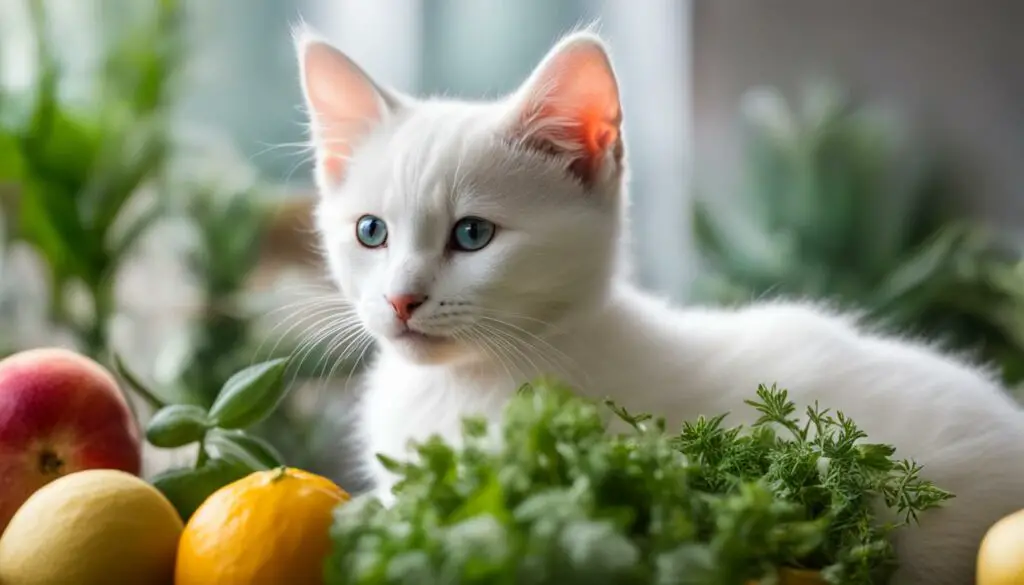
Treating Intestinal Diseases in Kittens
When it comes to gas in kittens, intestinal diseases can be a significant contributing factor. Conditions such as dysbiosis or inflammatory bowel disease (IBD) can disrupt the normal functioning of the digestive system, leading to increased gas production. To effectively address these issues, treatment options tailored to the specific disease may be necessary.
Evaluating the Diagnosis
Diagnosing intestinal diseases in kittens requires a thorough evaluation by a veterinarian. They will conduct a detailed history assessment, perform a physical examination, and may recommend additional tests such as X-rays, ultrasounds, or fecal examinations. This comprehensive approach helps identify the underlying cause of the gas and facilitates appropriate treatment planning.
Treatment Options
Treating intestinal diseases in kittens often involves a multi-faceted approach. Depending on the diagnosis, treatment options may include:
- Prescribed medications: Your veterinarian may prescribe medications such as corticosteroids or antibiotics to manage inflammation or infection.
- Special diets: Some kittens with intestinal diseases benefit from specialized diets that are easily digestible and gentle on the digestive tract.
- Probiotics: These beneficial bacteria can help restore the balance in the gut and alleviate symptoms associated with dysbiosis.
It’s important to follow your veterinarian’s recommendations closely and to schedule regular check-ups to monitor your kitten’s progress. Close monitoring is particularly crucial for managing chronic conditions like IBD to maintain their overall health and well-being.
| Treatment Options | Description |
|---|---|
| Prescribed medications | Your veterinarian may prescribe corticosteroids or antibiotics to manage inflammation or infection. |
| Special diets | Specialized diets that are easily digestible and gentle on the digestive tract can help manage symptoms. |
| Probiotics | These beneficial bacteria can restore gut balance and alleviate symptoms associated with dysbiosis. |
By addressing the underlying intestinal diseases in kittens, gas production can be effectively managed, leading to improved comfort and overall well-being. Regular communication with your veterinarian and adherence to the prescribed treatment plan are essential for the best outcomes.
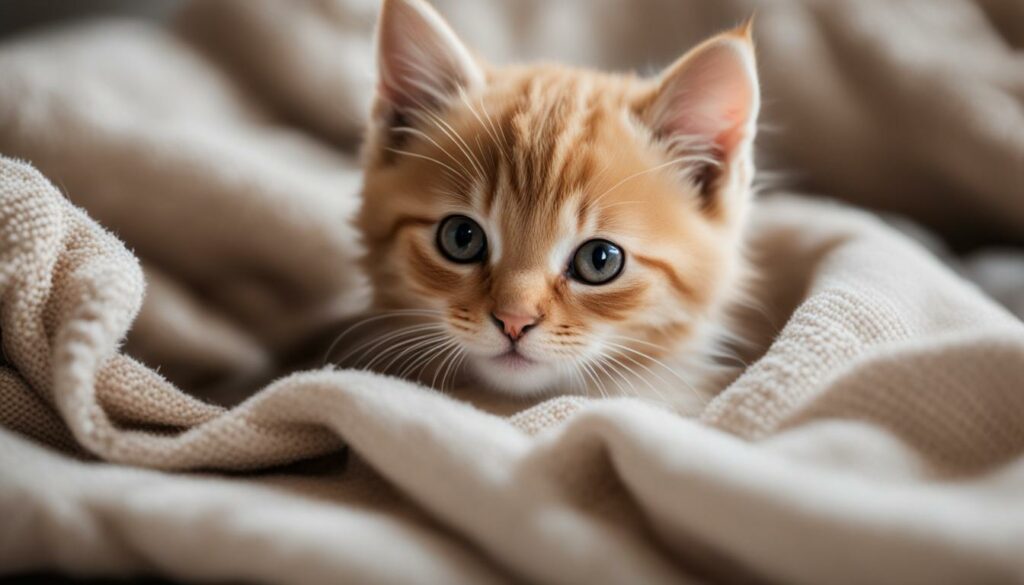
Seeking Veterinary Care for Gassy Kittens
If your gassy kitten is experiencing persistent symptoms or showing additional signs of illness, it’s important to consult your veterinarian. As a pet owner, it can be reassuring to know that your furry friend is receiving the necessary care and attention.
During a veterinary appointment, your veterinarian will perform a thorough examination of your kitten, including palpating their abdomen and listening to their gastrointestinal sounds. They may also ask you questions about your kitten’s diet, overall health, and any recent changes or behaviors you’ve noticed.
In some cases, your veterinarian may recommend further tests to determine the underlying cause of the gas. These tests may include blood work, fecal examination, X-rays, or ultrasound imaging. These diagnostic tools can provide valuable insights into your kitten’s gastrointestinal health and guide appropriate treatment decisions.
Based on the findings, your veterinarian will develop a tailored treatment plan for your gassy kitten. This plan may involve dietary adjustments, medication administration, or additional investigations if necessary. It’s important to follow your veterinarian’s advice and instructions closely to ensure the best outcome for your furry companion.

Evidence-Based Treatment Options for Gassy Kittens
| Treatment Option | Description |
|---|---|
| Dietary Changes | Switching to a quality cat food with fewer gas-producing ingredients and avoiding common allergens. |
| Probiotics | Supplementing your kitten’s diet with beneficial bacteria to support a healthy digestive system. |
| Medications | Prescribing medications, such as antacids or anti-inflammatory drugs, to address specific gastrointestinal conditions. |
| Parasite Control | Administering deworming medications to eliminate intestinal parasites that can contribute to gas. |
| Regular Check-ups | Scheduling routine veterinary visits for monitoring and preventive care. |
Remember, seeking veterinary care for your gassy kitten is crucial to ensure timely diagnosis and appropriate treatment. Your veterinarian is the best resource for addressing your concerns and providing personalized care for your furry friend.
Prevention and Long-Term Management of Gas in Kittens
As a responsible pet owner, preventing gas in kittens should be a priority. By following some simple steps, you can help maintain a healthy digestive system and provide long-term relief for your furry friend.
Feeding a Quality Cat Food
Choosing a high-quality cat food is essential in preventing gas in kittens. Look for brands that provide balanced nutrition and avoid ingredients known to cause gas, such as beans, peas, or excessive fiber. Consider consulting with your veterinarian to find the best food option for your kitten’s specific needs and sensitivities.
Gradual Dietary Changes
When transitioning your kitten to a new food, it’s important to do so gradually. Sudden changes in diet can disrupt their digestive system and lead to gas and discomfort. Begin by mixing a small amount of the new food with their current food, gradually increasing the ratio over a week or two. This gradual transition allows their digestive system to adjust and reduces the likelihood of gas.
Incorporating Probiotics
Probiotics are beneficial bacteria that can support a healthy gut and aid in digestion. They can be particularly helpful in preventing gas in kittens. Talk to your veterinarian about incorporating a probiotic supplement or a cat food that includes probiotics into your kitten’s daily routine. These supplements can help maintain a healthy balance of gut bacteria and reduce the frequency of gas episodes.
By implementing these preventive measures, you can minimize gas in kittens and contribute to their overall well-being. Remember that each kitten is unique, so it’s essential to consult with your veterinarian for personalized advice and care. With a proper diet, gradual dietary changes, and the addition of probiotics, you can help your furry friend live a gas-free life.

Table: Prevention and Long-Term Management Tips for Gas in Kittens
| Tips | Description |
|---|---|
| Feed a quality cat food | Choose a balanced cat food brand that avoids gas-producing ingredients and meets your kitten’s nutritional needs. |
| Gradual dietary changes | Transition your kitten to a new food gradually to minimize digestive disturbances and gas. |
| Incorporate probiotics | Add a probiotic supplement or choose cat food with probiotics to support a healthy gut and reduce gas. |
Understanding Feline Flatulence
If your kitten is experiencing frequent gas, it’s important to understand the underlying causes and potential solutions. While gas in cats is not very common, excessive flatulence can indicate gastrointestinal issues that may require attention. Monitoring your cat’s normal gastrointestinal functions and seeking veterinary attention for any changes can help ensure their well-being.
There are a few factors that can contribute to feline flatulence. One of the main causes is dietary issues, such as consuming food that is difficult for the digestive system to process. Additionally, certain food ingredients can be more gas-producing than others. It’s important to assess your cat’s diet and consider switching to a food with fewer gas-inducing ingredients.
In some cases, excessive flatulence can be a sign of an underlying gastrointestinal condition. It’s important to consult with your veterinarian to determine if there are any underlying health issues contributing to the gas. They can perform a thorough examination and recommend appropriate tests to diagnose the cause of the flatulence.
Remember, every cat is unique, and what works for one may not work for another. Consulting with your veterinarian is crucial in developing a personalized plan to address your cat’s flatulence issues and promote their overall gastrointestinal health.

Diagnosing Gas in Cats
When a cat is experiencing gas, it’s important to accurately diagnose the underlying cause in order to provide appropriate treatment. Diagnosing gas in cats involves a thorough history assessment and physical examination conducted by a veterinarian. This helps identify any potential triggers or underlying medical conditions that may be contributing to the gas symptoms.
To further evaluate the cat’s condition and determine the cause of the gas, additional tests such as X-rays, ultrasounds, and fecal examinations may be necessary. X-rays can provide insights into the gastrointestinal tract, while ultrasounds can help identify any abnormalities in the organs. Fecal examinations can detect the presence of intestinal parasites, which can contribute to excessive gas production.
By conducting a comprehensive evaluation, veterinarians can gather valuable information to guide treatment decisions and tailor a plan that addresses the specific cause of the gas in cats. This individualized approach ensures that the treatment is effective and appropriate for the cat’s unique circumstances, promoting their overall well-being and comfort.

Diagnosing gas in cats can be a complex process, but with the expertise of a veterinarian and the use of appropriate diagnostic tools, it is possible to identify the underlying cause and provide targeted treatment. Being proactive about addressing gas symptoms in cats helps alleviate discomfort and ensures their digestive health.
Treatment Options for Gas in Cats
When it comes to addressing digestive issues in kittens, there are various treatment options available. The appropriate course of action will depend on the underlying cause of the gas. Here are some common treatment approaches:
1. Dietary Changes
Switching to a high-quality cat food that is easily digestible can help alleviate gas in kittens. Look for brands that are formulated to promote digestive health and avoid ingredients known to cause gastrointestinal issues. Additionally, feeding smaller, more frequent meals can prevent overeating and reduce the likelihood of excessive gas.
2. Probiotics
Probiotics, which are beneficial bacteria that support a healthy gut, can be a helpful addition to a kitten’s treatment plan. These supplements can restore the natural balance of bacteria in the digestive system and improve overall gut health. Consult with your veterinarian to determine the appropriate probiotic for your kitten’s specific needs.
3. Medications
In some cases, medications may be necessary to address gas-related issues in kittens. Your veterinarian may prescribe medications such as antispasmodics or antacids to alleviate discomfort and reduce gas. It’s important to strictly follow the prescribed dosage and duration of treatment as directed by your veterinarian.
| Treatment Option | Description |
|---|---|
| Dietary Changes | Switching to a high-quality, easily digestible cat food can reduce gas. |
| Probiotics | Adding beneficial bacteria to the digestive system can improve gut health. |
| Medications | Prescribed medications can alleviate discomfort and reduce gas. |
“Addressing the underlying cause of gas in kittens is crucial for effective treatment.”
It’s important to remember that treatment for gas in cats should be tailored to the individual needs of your kitten. Consulting with a veterinarian is essential for accurate diagnosis and appropriate treatment recommendations. They will be able to provide personalized advice and guide you through the treatment process to ensure the best outcome for your furry friend.
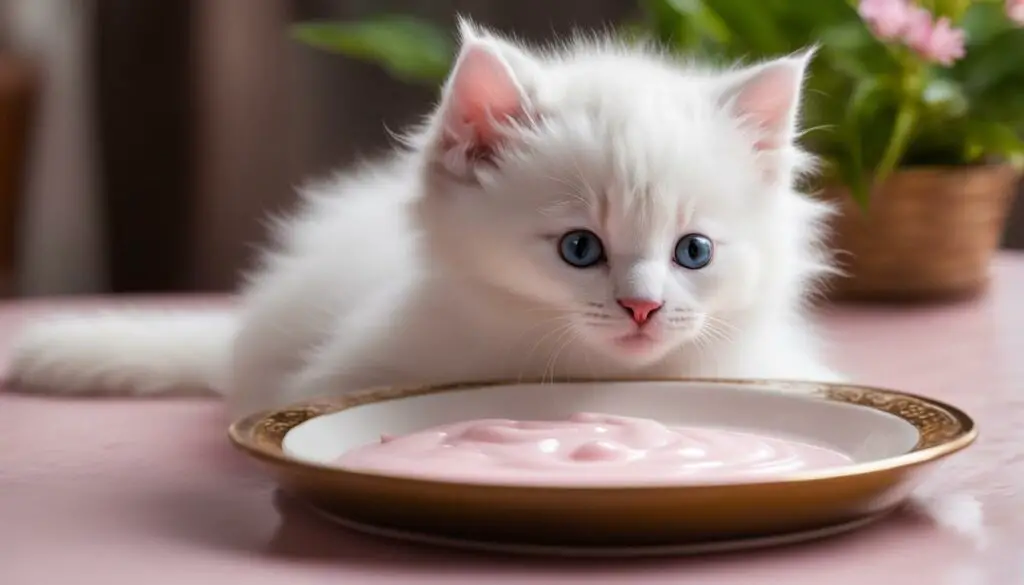
Conclusion
Gassy kittens can be a cause for concern, but there are solutions to provide relief. By addressing the underlying causes, implementing natural remedies, and seeking veterinary care when needed, you can help your furry friend feel more comfortable and alleviate their digestive issues.
It’s important to remember that prevention is key. By managing your kitten’s diet, incorporating probiotics, and maintaining regular veterinary check-ups, you can minimize the occurrence of gas and promote a healthy digestive system in the long term.
If your kitten is experiencing persistent gas problems or additional signs of illness, it’s crucial to consult your veterinarian. They can perform a thorough examination, conduct necessary tests, and recommend appropriate treatment based on the underlying cause of the gas.
Remember, every kitten is unique, and what works for one may not work for another. So, be patient and attentive to your kitten’s needs. With the right care and attention, you can help your gassy kitten enjoy a happy, healthy, and gas-free life.
FAQ
How can I help my gassy kitten feel more comfortable?
You can provide comfort to your gassy kitten by following these easy steps: manage their diet, consult with a veterinarian, and consider medication or deworming if necessary.
What causes gas in kittens?
Gas in kittens can be caused by a variety of factors, including dietary issues, medical conditions, and intestinal parasites.
Can changing my kitten’s food help reduce gas?
Yes, changing your kitten’s food to a brand with lower fiber or soy content can help reduce gas. It’s important to introduce the new food gradually and monitor their digestion.
When should I consult a veterinarian for my gassy kitten?
If your gassy kitten has persistent symptoms or additional signs of illness, it’s important to consult your veterinarian for a thorough examination and appropriate treatment.
What can I do to prevent gas in kittens?
Preventing gas in kittens can be done through proper diet management, regular veterinary care, and parasite prevention. Feeding a quality cat food and avoiding sudden dietary changes are essential.
Is excessive flatulence in cats common?
While gas in cats is not very common, excessive flatulence can indicate underlying gastrointestinal issues that may require veterinary attention.
How is gas in cats diagnosed?
Diagnosing gas in cats involves a thorough history assessment, physical examination, and may require additional tests such as X-rays, ultrasounds, or fecal examinations.
What treatments are available for gas in cats?
Treatment for gas in cats depends on the underlying cause and may involve dietary changes, probiotics, medications, deworming, or managing specific gastrointestinal conditions.
What can I do to alleviate my gassy kitten’s digestive issues?
By addressing the underlying causes of gas and following appropriate treatment plans, you can help your gassy kitten feel more comfortable. Consult your veterinarian for personalized advice and care.
Source Links
- https://www.thesprucepets.com/why-do-cats-fart-554763
- https://wagwalking.com/cat/condition/gas
- https://www.petmd.com/cat/general-health/do-cats-fart

